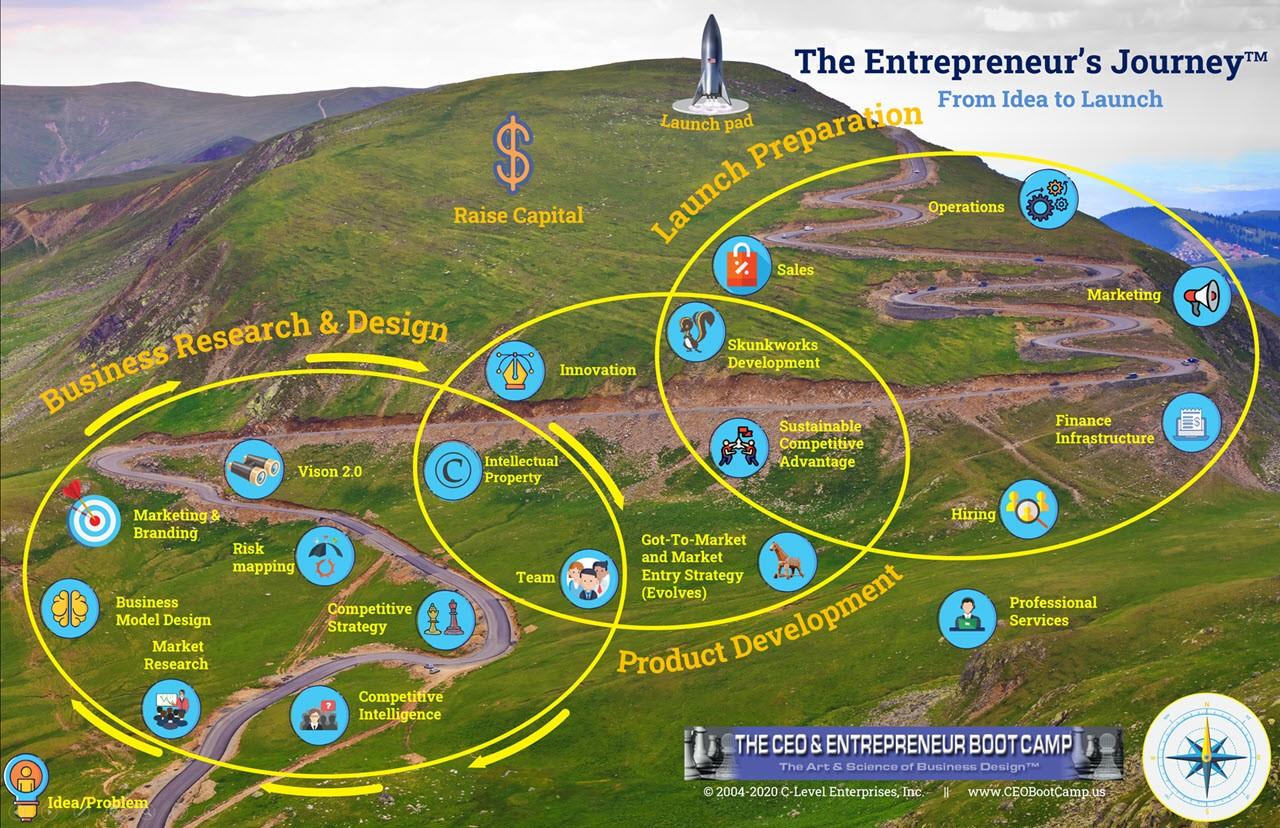What is the entrepreneurial process of creating a new venture?

There are different processes, but the one we teach at The CEO Boot Camp that can almost guarantee success of a new company or product is shown here:

There is a free video course on this page explaining this Entrepreneurial Journey.
How to Raise Millions for Any Company - Online Video Course
Bob Norton is a long-time Serial Entrepreneur and CEO with four exits that returned over $1 billion to investors. He has trained, coached and advised over 1,000 CEOs since 2002. And is Founder of The CEO Boot Camp™ and Entrepreneurship University™. Mr. Norton works with companies to triple their chances of success in launching new companies and products. And helps established companies scale faster using the six AirTight Management™ systems. And helps companies successfully raise capital.
Call (619) SCALE06 or email [email protected] for a complementary strategic consultation.
Where can I view data on startup valuations and funding rounds?

Raising funding is a complex process that few understands as they are often doing it for the first time. I would say about 90% of people I see present to angels just “don’t get it”. They do not understand what outside investors need to see to invest. The course above gives the foundational fundamentals that ALL investors want to see.
Developing a company that has a higher valuation can be the difference between owning < 15% (average exit ownership of founders) and 50%+ like Mike Dell, Bill Gates and Elon Musk. Bootstrapping, friends and family investment, then angels is the classic path, but there are over 40 other categories of investment funds that can be tapped into which represent more than 100X what VCs and angels invest.
 | Learn more about our Growth and Scaling (GSP) |
| For a free video consultation call on what your |
Pitch book just released a full report on...
Everyone Wants to Be an Entrepreneur

By Arielle Pardes
Applications for new businesses rose 20 percent last year, after languishing for a decade. Many newly minted founders attribute it to the pandemic.
ANGELA MUHWEZI-HALL HAD a startup idea long before the pandemic—it just never seemed like the right time. She had a steady job at a university, a 401(k), and the ability to take paid time off. Then came March 2020. As the university shut down and Muhwezi-Hall retreated to work from home, she started to think about making the leap.
What she wanted to build was a job platform for service workers. While the idea was old, the timing was suddenly perfect: Millions of service workers had just been laid off and were looking for new jobs. She recruited her sister, Deborah Gladney, to help build a prototype. By August, the sisters had quit their full-time jobs to work on the startup, QuickHire.
Muhwezi-Hall and Gladney are part of a rising tide of first-time entrepreneurs. In 2021, more than 5.4 million applications...
Why do Most Start Ups Fail?

I wrote an eBook to answer this exact question, title The Top 20 Reasons Startups Fail and How to Avoid Them. It is based on some research. You can download it free here: top20
I have also created a 3-part video course here reviewing this question from the perspective of what learning and tools are required to avoid these twenty mistakes called The Entrepreneur's Journey here.
Join Live Webinar on 12th April 2022
Bob Norton is a long-time Serial Entrepreneur and CEO with four exits that returned over $1 billion to investors. He has trained, coached and advised over 1,000 CEOs since 2002. And is Founder of The CEO Boot Camp™ and Entrepreneurship University™. Mr. Norton works with companies to triple their chances of success in launching new companies and products. And helps established companies scale faster using the six AirTight Management™ systems. And helps companies successfully raise capital.
Call (619) SCALE06 or email...
What Are OKRs, MBOs and KPIs?

How Professional Managers Set Goals and Get 56% More Productivity from Their Teams
The Father of Management, Peter Drucker first invented a formal goal setting process called Management By Objective (MBO back in the 1960s. Human beings have not change much at all since then. Most people require supervision and managers. MBO is both a process and very specific goal. An "MBO" is also a single company or personal objective. A goal is turned into an objective by making it very specific. Even binary "done" or "Not done". It is the secret great mangers do well and most managers fail to do at all.
OKR is the same as MBO, just a rebranding in more recent decades. And Key performance Indicators are just the metrics that can be measure and tracked over time to see trends, good and bad. I always separate metrics (pure numbers) from other MBOs or goals because they can be crammed tightly into a spreadsheet and act as a health indicator...
How Do I Introduce Myself as a New Manager?

First, you learn the difference between “there” (a place) and “their” possessive plural. If you lack written skills, it will be easy to lose the respect of others that have them. In fact, it could become a joke that prevents anyone from respecting you unless you work in the mafia. I say this because this question was sent to me in writing, and this is a pretty common error that says your English/ written skills are bad. Written skills are critical. You must be concise, unambiguous, clear and more.
I just recently had a contractor set a Google Ads budget at a much higher rate than I had said to him in an email I sent. I thought that I was 100% clear, but his interpretation was a daily number now, instead of a total for today. Oops! That mistake cost over $1,000 in extra ad spend before I even knew it happened. So even with 30+ years of management experience, I am still making mistakes. I read more into the contractor's...
What are Quarterly OKRs and How do you Pick Good OKRs?

That is kind of like asking how to paint a good painting or write a good song.
Practice and basing them on the long-term Strategic Plan is the best simple answer.
Having been trained management teams since 2004 to do this I have found almost no one does it well at first. It requires about 2 monthly cycles of practice to get it. However, each time people will do better and understand the value more. I have a course on Online Courses - Learn Anything, On Your Schedule | Udemy on this and a video here: Management Best Practices that explains why MBO/OKR are not optional.
Every successful company does this somehow, though there are some variations. I strongly recommend both training and coaching to make it stick and keep people on track to get the massive advantages that can come from a good process.
 | Learn more about our Growth and Scaling (GSP) |
| For a free video consultation call on what your |
What Are the Three Levels of Management?

Like any model, this just divides a highly complex topic, or spectrum, into a number of levels to simplify. However, this can be useful to set some framework and goals to climb that ladder.
First, Management and Leadership are “Arts” not skills, consisting of hundreds of skills combine and requiring experience not book learning. That said, I created a model with five styles of Management learning, each would enable a person to start their own company and do well. They are only learned through experience.
Every person should be managed mostly using one of these techniques, or styles:
1. Micromanagement - the lowest form to supervise individuals in real-time. Generally, only need for low level and lazy workers. This style is only for inexperienced people or those new to the organization. Or people in very low-level jobs that need to be monitored constantly, often because the job is repetitive, unskilled and low paying where it is difficult to find...
What are Some One-on-One Manager Best Practices?

Management is an art, not a skill that can be put into an easy list of rules. Your question is kind of like asking how do I paint a perfect work of art? Even Leonardo Davinci could never answer that as it takes years, even decades of experience to learn.
However, that said, some important foundational philosophies are known to be very effective. I’ll list a few below. I would recommend reading The Daily Drucker or other Peter Drucker books first. I also have a Recommended Reading List below with many great classics and serious Entrepreneurs and business owners should read most, if not all, of them.
Tried and true management philosophies:
1. Set up a win-win scenario between every employee in the company providing challenge, learning, career growth and encouragement. More for those that put in the extra effort to study and learn on their own time. This will allow you to attract and keep the best people. As the best people want challenge, growth and appreciation. These are...
Is Management Still Relevant As A Course Of Study Today?

Of course. Anytime people are needed, management is a required skill, or more accurately a required art. It is also a philosophy which generates the culture of a company that should be appropriate to its own market circumstances.
And yes, I agree with Elon Musk and others that our university system cranking out MBAs is not a solution. Colleges and universities are failing to adapt to the new world. There are now so many specialties, industries, and skills that few programs provide the practical learning needed to be a successful Entrepreneur or manager. That is why I created The CEO & Entrepreneur Boot Camp in 2004.
People change on an evolutionary timescale, and almost all still need to be managed. No amount of technology will replace the need for managers and management. At least 80% of people need to be guided in their work. And they always will. Because most people are followers, not leaders. They do not want to take...





